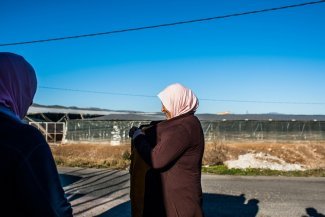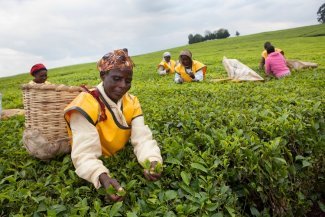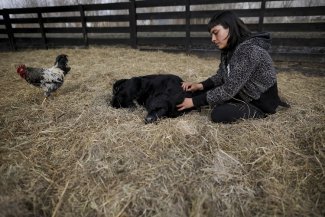“Countries like Yemen, Egypt, Eritrea, Ethiopia, Somalia that depend heavily on wheat imports, that don’t sell oil and have a population severely impacted by energy and food price inflation, have a very significant social crisis developing. We are seeing the crisis unfold as we watch it,” says Olivier De Schutter, the UN special rapporteur on extreme poverty and human rights.
The war in Ukraine has focused attention on food security as newspapers, academics and politicians warn of shortages just around the corner. According to Olivier De Schutter, the United Nations special rapporteur on extreme poverty and human rights, and the co-chair of the International Panel of Experts on Sustainable Food Systems, an independent group of experts from various backgrounds, the crisis is “already there” for many developing countries.
In a wide-ranging interview, he tells Equal Times that global warming, the linking of food production with the fossil fuel economy, and population growth cumulatively demand that we embark on “a new agricultural revolution”.
With nearly 250 million people thought to be on the brink of famine and 1.6 billion people food insecure, there seems to be a gathering sense of inevitability about a food crisis. Do you share it?
This did not start on 24 February with Russia’s invasion of Ukraine. Prices of major food commodities – wheat maize, soybean – started to increase in 2021, closely linked to the increase in oil and gas prices. Food production consumes an enormous amount of fossil fuel energy, particularly fertiliser production from natural gas, [as does] production for food transport and the packaging and processing of raw materials. When energy prices increased last year, so did the costs of producing those commodities.
The production of biofuels – ethanol and biodiesel – from rapeseed, maize and sugar beet is encouraged when energy prices go up because they become more profitable. Until we regulate the volumes of biofuels produced, this competition between fuel and food will continue. On financial markets, commodity index funds [also bundle] agricultural commodities, minerals and energy – petrol and gas – and when energy prices go up, so do the value of the shares.
Considering the events in Ukraine, does that now make a food crisis inevitable?
It is there [already]. Many countries have for many years been producing for export markets because it was profitable and allowed them to repay foreign debt. These countries developed export-led agriculture and grew hugely dependent on imports to feed their populations. Twenty-six countries now depend on Ukraine and Russia for more than 50 per cent of their wheat consumption – that’s huge. They are at great risk, particularly since they are heavily indebted and can’t suddenly borrow money from the US or Canada to compensate for interrupted imports.
Countries like Yemen, Egypt, Eritrea, Ethiopia, Somalia that depend heavily on wheat imports, that don’t sell oil and have a population severely impacted by energy and food price inflation, have a very significant social crisis developing. We are seeing the crisis unfold as we watch it, and the only short-term measure we can take is humanitarian. We should do that, but we should not forget that the long-term solutions consist in delinking agricultural production from fossil fuel energy and encouraging countries to produce more for themselves.
What about more systemic problems, like climate change?
We need to build a much more resilient agricultural system that’s better equipped to support climate disruptions [like] droughts, floods and landslides. Data shows that the more diversified your cropping scheme is, the more you plant trees alongside crops; the more equipped your farmers will be. It’s also mitigating climate change by reducing emissions. Healthy soils capture much more organic content, stock carbon, and function as carbon sinks. Without soils functioning as carbon sinks, we will be unable to achieve climate objectives. But in the past 50 years, we’ve been doing the opposite, developing monocultures that rob soils of their nutrients and biodiversity.
We know that livestock production uses some 80 per cent of land for only 20 per cent of global calories. So, reducing our meat consumption in rich countries – where it’s much higher than dieticians recommend – should be a priority. The UN FAO [Food and Agriculture Organization] estimates that total man-made greenhouse gas emissions from livestock production increase to 30 per cent once you take into account land use for feed production and the processing and transport of those feeds to animals. In a world of scarce resources, that is becoming unaffordable.
By 2050, the world’s population is expected to soar to 10 billion and to become wealthier, which could dovetail a rise in meat consumption. But we don’t have enough land to produce sufficient volumes of meat and we don’t know if lab-grown meat will ever take off. Do we need a new agricultural revolution?
You’re right that as a global middle class emerges, meat consumption increases because when you have improved purchasing power, it’s a status thing to diversify your diet and eat more meat. We’ve seen this in China in recent years very spectacularly. Cultured or lab meat is attracting huge amounts from investors and I think we have to be very cautious about claims made by the owners of those technologies about their benefits. Their greenhouse gas impact depends on [whether] the source of the energy they use is renewable.
Other meat substitutes may come from large monocultures that destroy soil health and reduce biodiversity, with knock-on impacts for the ability of soils to function as carbon sinks. Coconut and palm oil play a very important role in many meat substitutes on supermarket shelves, yet their production destroys forests in South-East Asia. An agroecological revolution means moving away from a linear approach to food production in which you have inputs – production on the farm – and then outputs sold on the market, and waste you have to dump somehow. Agroecology is more cyclical. It tries to reuse agricultural waste as inputs; to produce inputs locally; to reduce the use of pesticides and chemical fertilisers.
The key idea is to use nature as an ally and work with it, rather than treating it as a sort of animal we have to domesticate, to master, control or simplify to produce more. Agroecology is more labour-intensive and thus not competitive enough in the current economic conditions. The problem is that most measures of productivity only look at the total output of a particular crop. This misses negative externalities and does not take into account the enormous use of energy in food production.
Agroecology suits the 21st century but it requires support so that farm workers have a decent income. That is the major stumbling block. We could get around it by taxing the negative externalities of industrial agriculture as these are social, sanitary and environmental costs that are not accounted for. If the fiscal system worked correctly, the negative externalities from industrial agriculture would be internalised – taxed – to reflect the [true] price of unsound farming practices. The revenues could be used to support the incomes of more sustainable farming. A carbon tax is not the full answer to the climate crisis but it’s part of this, indeed, revolution we need to put in place.
What about the idea of a meat tax?
For many years we’ve been treating cheap food as a substitute for social policies in order not to have to increase the minimum wage or social protection too much. We’ve been dumping cheap food on peoples’ plates so that even low-income households can feed themselves. We should realise that in rich countries today, it is the working class that suffers the most from [correspondingly] higher rates of obesity and associated diabetes and cancers linked to junk food. We should ensure that all households have access not just to cheap food but to adequate, diversified, nutritious diets. That also means increasing incomes for low-income families. This is why food policy should include a social dimension.
The agrifood sector is famously plagued by low pay, long hours and insecure contracts. How hopeful is it that workers are beginning to organise in fast food outlets like McDonalds and Starbucks?
I’m encouraged by seeing this. The interests of consumers in cheap food and of farmers in selling their crops at a high price have traditionally been opposed. But we now see that all these actors have reason to complain about the inefficiencies, absurdities and extractive nature of the food system. It’s encouraging that new alliances are emerging. In Europe we depend a lot on cheap agricultural labour, often made up of migrant workers who lack a guaranteed minimum wage, long-term contracts or access to social protection. In Spain, the Netherlands and Germany, it would be impossible to produce in the way we do today without them. And it creates bizarre migratory patterns where Ukrainian workers are imported onto Polish fields, and Polish workers travel to work on German fields. It’s very strange. One interesting thing about the Covid pandemic is that when borders were closed and international travel interrupted for six [to] nine months, Germany had to open up new migratory routes to be able to recruit workers.
But agencies hired migrants without face masks and crammed eight people to a car to work in unventilated abattoirs, where a viral spread was almost guaranteed. Are unions the answer in those situations?
We can speak here of internal social dumping. The supply chains that import workers who are exploited at low wages under harsh and unhealthy conditions are a form of internal social dumping that’s problematic. Local farm workers’ unions have reasons to be concerned about this and I think that the International Union of Food Workers could be convinced to do more about it, maybe in collaboration with the major farmers’ unions. No farmer has an interest in this system being perpetuated. But farmers sometimes have no choice but to exploit workers like that if their neighbour – the competing farmer – does that too. We’re all driven to this race to the bottom. Maybe the responsibility of governments in those situations should be to bring farm workers’ unions and farmers’ unions around the table to find common ground to address the issue.
Do farm lobbies in Europe have an effective veto over that sort of change?
Many NGOs and smaller farmers unions are now rallying behind the idea of food democracy. It means that food and farming sector policies should not be decided behind closed doors, under the pressure of lobbies. They should be decided in the open with a much more transparent and inclusive way of proceeding.













